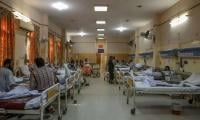Besides the external garbage in Karachi that we see on roads and streets, another type of garbage is also found in the city — the internal garbage that is presents in the minds of people.
This was stated by novelist and playwright Noorul Huda Shah as she spoke at a session of the Karachi Literary Circle that was held at the Envicrete Auditorium on Saturday to pay tribute to the founder of the circle, former Karachi commissioner Iftikhar Shallwani who has been currently serving as the city administrator since the tenure of the elected local governments ended.
She remarked that though Shallwani’s current job is to clean the external garbage of Karachi, the Karachi Literary Circle founded by him would address the issue of the city’s ‘internal garbage’.
The literary circle is a body of writers, book lovers and literary figures of all the six districts of Karachi. It was formed by Shallwani on December 2 last year to broaden the literary horizon of the city.
At the session on Saturday, Shallwani announced that awards would be given to budding artistes and writers of the city to encourage them. He said the literary circle could decide if the awards should be held on a quarterly or half-yearly basis.
Journalist and media person Ghazi Salahuddin stated in his introductory speech that when Shallwani was transferred from the post of the commissioner to the post of the Sindh local government secretary, the circle had decided to hold a farewell ceremony in his honour, but then he was made the city administrator and now the circle was welcoming him in his new post.
Noorul Huda said members of the literary circle wanted Shallwani to help the circle expand its roots throughout the city. Salahuddin was also of the view that the circle should include many areas of the
“We need to go to people and hold periodical meetings in places such as Gulshan-e-Iqbal, Lyari and Naziambad,” he said.
Asif Farruki remembered
Shallwani and other participants also paid rich tributes to the late Asif Farrukhi, the co-founder of the Karachi Literature Festival (KLF), writer and literary critic who lost his life during the COVID-19 lockdown.
Noorul Huda said the most disturbing thing during the lockdown for her was the sudden demise of Farruki.
When Farruki initiated the KLF, she said, the situation of the city was far more dangerous than the pandemic as one did not know if he or she would return home alive.
She recalled how when the KLF started in 2009, she did not attend it despite repeated invitations from Farruki as she feared a bomb blast. “He [Farrukhi] proved that knowledge and literature can wash away the hatred,” she said, adding that Karachi had always been a restless city as it was exploited for personal gains. “Cities which are used for personal gains are ruled by deaths and hatred,” she remarked, adding that in such cities, people like Farruki were needed the most.
Salahuddin said that people did not know how much damage the demise of Farruki had caused to the city. “When we formed this circle, he was with us. His demise is a loss to this city,” he said.
Journalist Peerzada Salman said Farruki was an extremely talented man with a fertile mind. He shared how his sudden demise had left them all perturbed. He read out Farrukhi’s short story in Urdu, titled ‘Spiderman’.
Writer and poet Kashif Raza was of the opinion that Farruki was Karachi’s icon who worked in all departments of literature. He agreed with Noorul Huda that the city’s internal garbage needed to be cleaned through love and that could only be done through its poets and writers. He called for naming Karachi’s colleges and streets after its poets and writers.
Shallwani told the event how much relieved he was after he left the charge of the commissioner. He said he was planning to take leave and go out of the country to his son, but was given the charge of the city’s administrator.
He recalled how he asked his subordinates after taking the charge of commissioner about a broken glass at the Frere Hall and was told that it had broken in a bomb blast outside the American consulate and could not be repaired since then.
“I said if the bomb blast took place 20 years back and the glass couldn’t be repaired because of that, the entire Europe, Hiroshima and Nagasaki, and the entire world where massive wars took place, would have remained the same.”
The administrator added that they had set up a street library in Lyari to tap people’s creativity in the area. On October 4, he said, they would try to bring 10 children from the best schools of Karachi and 10 from schools in Lyari to sit across a table and interact.
“Just see what happens. They [children of Lyari] can do amazing things for the city and this country,” he said.
An aerial view of the commercial district of Pakistan's port city of Karachi. — AFP/File20th Emerging Talent...
This image released on August 18, 2017, shows a branch of the Allied Bank Ltd. — Facebook@Allied Bank...
Karachi Commissioner Hasan Naqvi seen in this image on January 21, 2025. — Facebook@Commissioner Karachi...
Sukkur Mayor Barrister Arsalan Islam Shaikh in group photo at Sukkur Sculpture & Painting Exhibition on January 15,...
Karachi police chief Javed Alam Odho speaks in a meeting of the Law and Order Committee of the Karachi Chamber of...
A view of the K-Electric head office, with solar panels at the parking area, in Karachi. — K-Electric website/...







